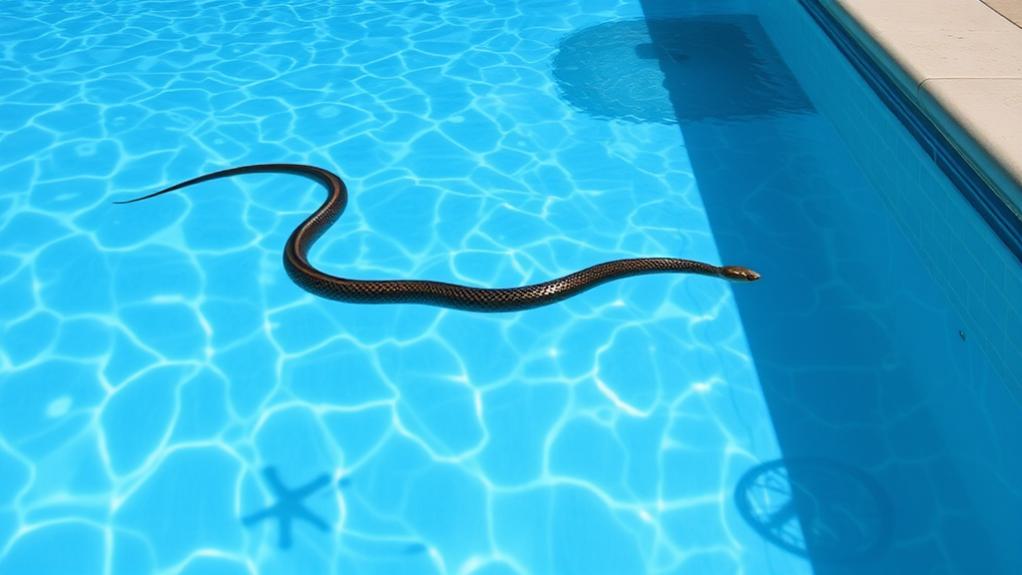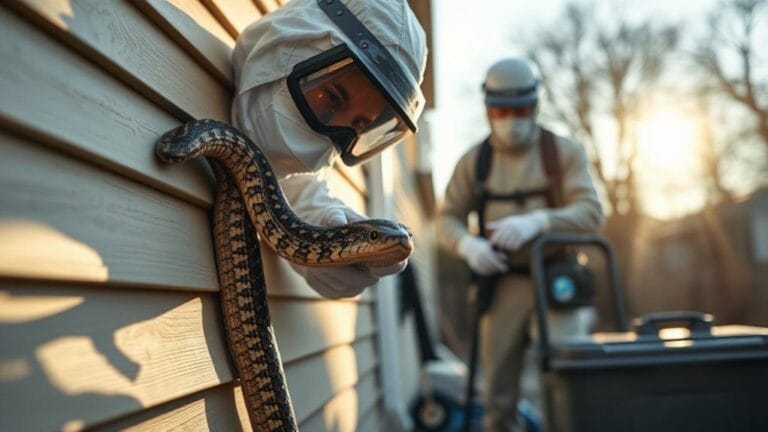If you spot a snake doing laps in your pool, don't panic – but don't invite it for a swim either! First, get everyone (yes, including Fido) safely inside. Grab your trusty pool skimmer – it's about to become your snake-wrangling buddy. Keep your distance while using the skimmer to gently guide the snake toward the shallow end or pool steps. Take quick photos for identification if you can. Not feeling brave? Call wildlife control – they're pros at this stuff. Can't tell if it's venomous? Don't play guessing games with your safety. There's a whole strategy to keeping these scaly swimmers out of your pool paradise.
Immediate Safety Steps
Table of Contents
Upon discovering a snake in your swimming pool, taking swift and calculated action is essential for everyone's safety.
Don't panic – yes, there's a snake doing laps in your pool, but freaking out won't help anyone. Consider using snake tongs or traps if you have them available, as these tools can help with safe removal.
Your first moves are vital:
- Clear the area immediately. I mean it – get those kids and pets inside faster than you can say "reptilian swimmer."
- Grab your trusty pool skimmer. It's about to become your new best friend.
- Stay back! Maintain a safe distance. This isn't the time to prove how brave you are.
Pro tip: If you're not sure whether it's venomous, don't play snake charmer. Call wildlife control and let the professionals handle it.
While waiting for help, snap some photos. Trust me – you'll want these for identification purposes or, at minimum, an interesting story for social media.
Why Snakes Choose Pools
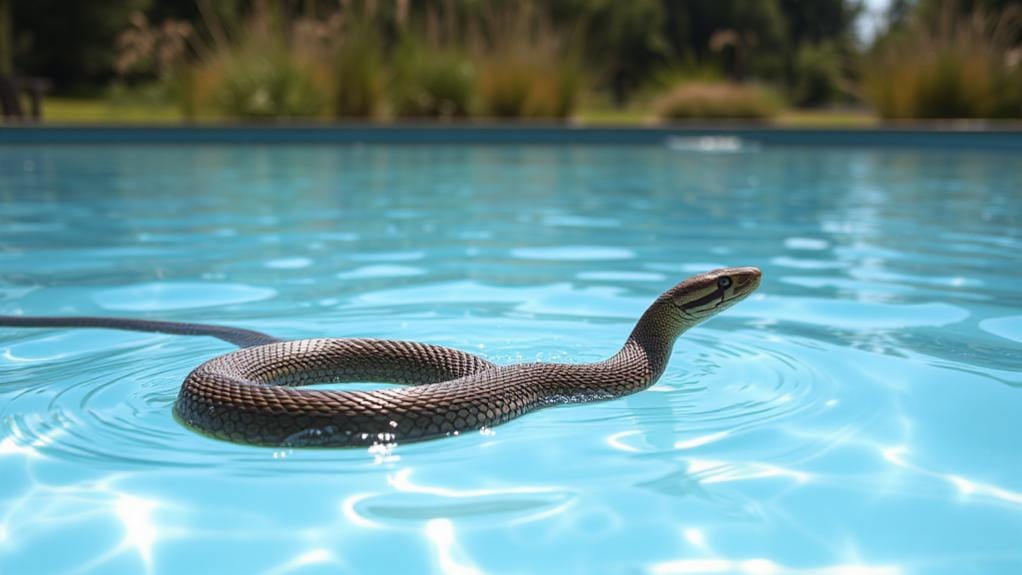
Now that you know how to respond when spotting a serpentine swimmer, let's look at what brings these scaly visitors to your pool in the first place.
Your backyard oasis isn't just attractive to you – snakes find it pretty irresistible too. During hot, dry spells, that sparkling pool of yours becomes a five-star resort for our slithering friends.
When they're not in winter brumation, snakes actively seek out water sources to regulate their body temperature. And let's be honest: you've basically created the perfect snake hangout spot.
Here's what makes your pool attract snakes:
- It's their personal drinking fountain when natural water sources are scarce
- The cool water gives them sweet relief from scorching temperatures
- You're running an all-you-can-eat buffet with those frogs and insects hanging around
- Those cozy spots around your pool deck? Perfect snake lounging areas
*Pro tip: If you want to keep snakes away, start by removing their favorite amenities.*
Identifying Common Pool Snakes
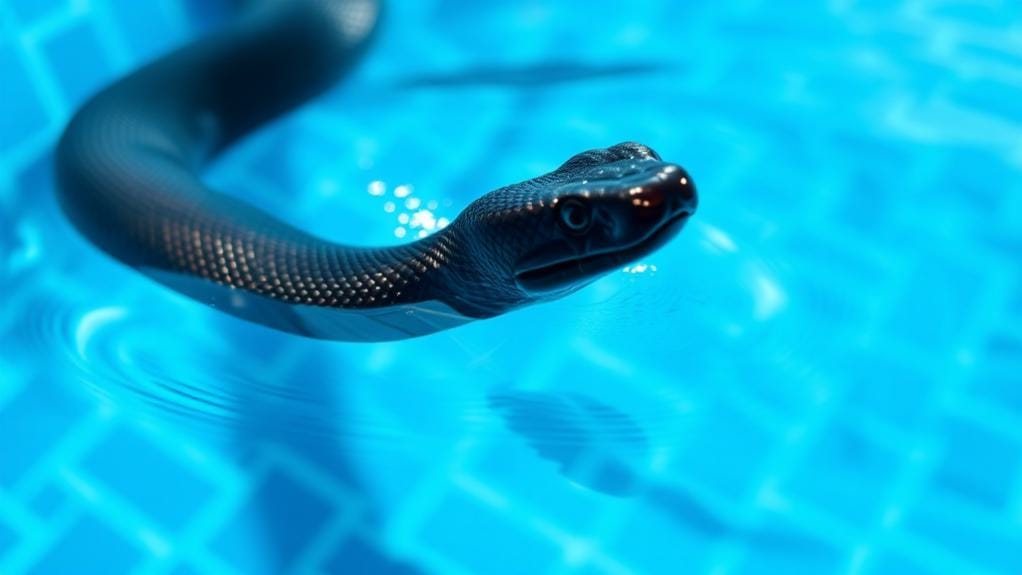
Snake identification is your first line of defense when dealing with pool intruders. I'll help you spot the most common non-venomous snakes you might find taking a dip in your pool. Trust me – knowing what you're dealing with makes all the difference!
| Snake Type | How to Spot It | Behavior |
|---|---|---|
| Water Snake | Dark & chunky with bands | Swims like a pro |
| Garter Snake | Slim with stripes | Darts away fast |
| Rat Snake | Long & lean, often gray | Climbs everything |
When identifying common pool snakes, grab your smartphone. There are tons of great ID apps that'll help you figure out which species of snake you're hosting at your impromptu pool party. *Pro tip: Most non-venomous snakes will try to escape when you approach – if it's standing its ground, back away slowly!*
Safe Snake Removal Methods
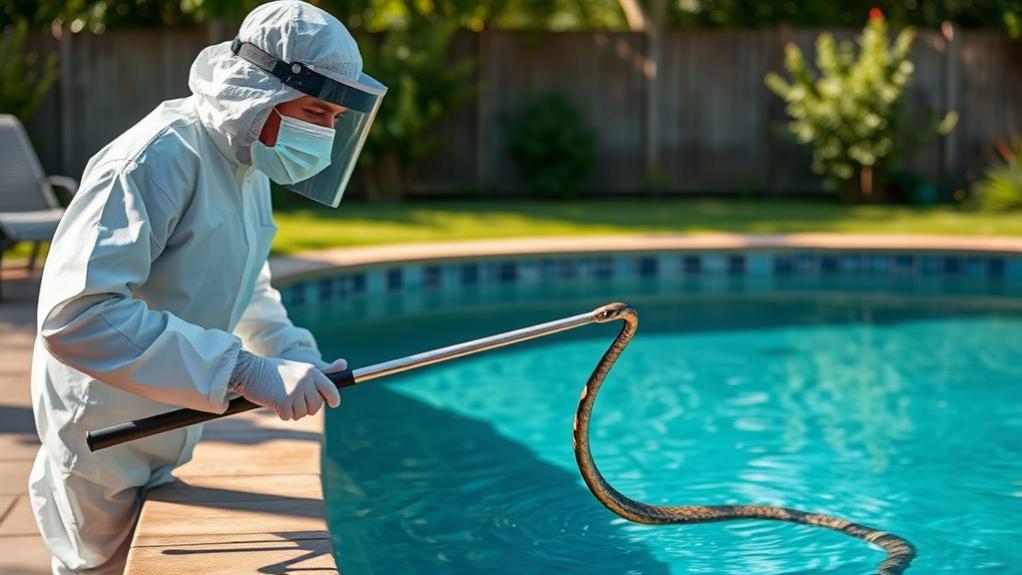
So you've spotted a snake in your pool – what's the safest way to handle this slithery situation?
While natural snake deterrents like cedar oil and cinnamon can help prevent future visits, immediate action is needed when a snake's already taking a dip.
Let me be clear: snake removal isn't the time to channel your inner Steve Irwin. Your best bet is to use a pool skimmer – it keeps you at a safe distance while letting you fish out your uninvited guest. Think of it as a really long selfie stick, except for snakes.
If you're absolutely sure the snake's harmless (and I mean 100% sure, not "my cousin's friend said it looks fine"), you can try using gloves and gentle handling.
Not feeling brave? Smart move! Call a professional – they deal with these situations daily.
Pro Tip: *Set up slanted boards around your pool's edges. Sometimes these crafty swimmers will find their own way out, and you can keep your pool snake-free without breaking a sweat.*
Creating Snake-Free Pool Environments
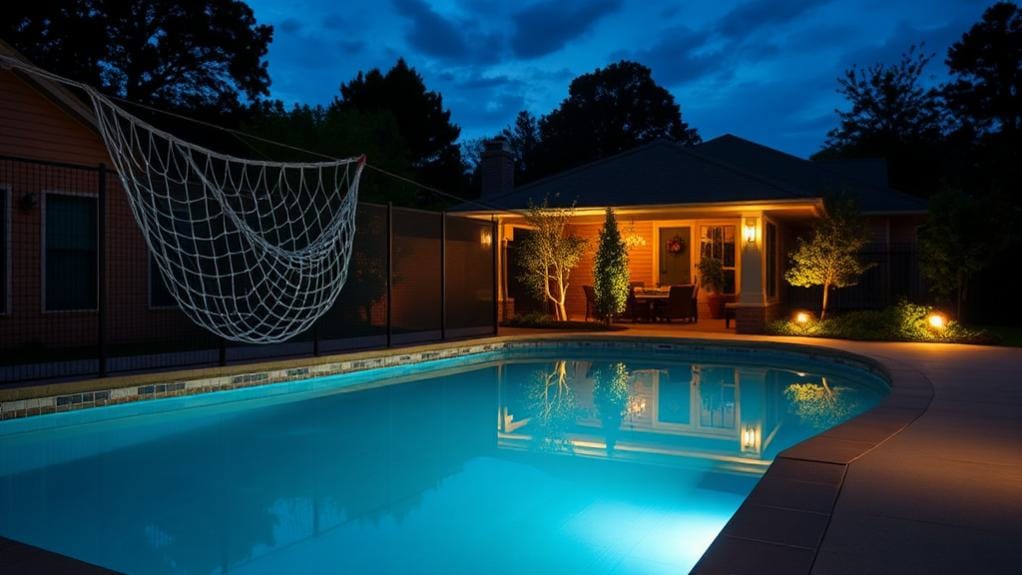
While knowing how to remove a snake from your pool is important, preventing these scaly visitors in the first place will save you a lot of stress.
Let's make your pool area about as appealing to snakes as a salad bar is to a lion.
To prevent snakes from entering, install a fence that's at least 3-4 feet high.
And yes, you'll need to bury it a few inches deep – snakes aren't exactly stopped by "No Trespassing" signs.
The most effective barriers use 1/4-inch mesh fencing to guarantee even smaller snakes can't slip through.
Pro Tips:
- Keep the pool area clean and debris-free. No snake wants to crash your pool party, but they love messy yards.
- Trim those bushes! Overgrown vegetation is basically a snake's version of a five-star hotel.
- Try snake repellents like white vinegar or ammonia around the perimeter.
- Use pool covers whenever you're not swimming – they're not just for looks.
Professional Wildlife Control Services
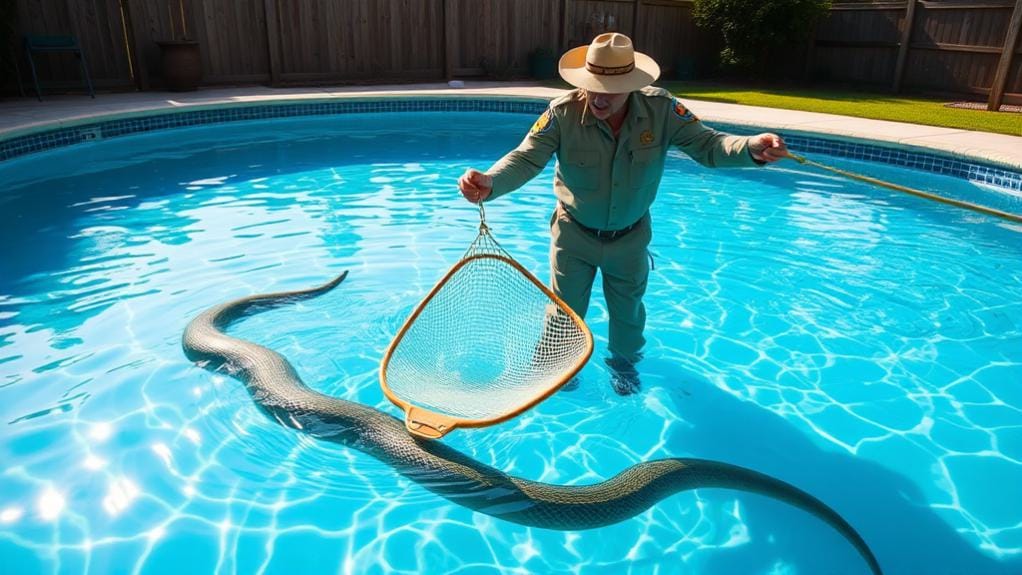
Sometimes a pool's unwanted visitor requires more than DIY solutions, which is why professional wildlife control services are your best backup plan.
I've seen enough DIY snake-wrangling disasters to know when it's time to call in a pro to help.
Snake habitats vary, making expert identification essential for proper removal.
Here's why Wildlife Removal experts are worth every penny:
- They're available 24/7 (because snakes don't exactly keep business hours)
- They'll correctly identify your scaly swimmer (no more playing the "venomous or not?" guessing game)
- A trained professional knows exactly how to safely relocate the snake without harming it
Pro Tip: Save your local wildlife control number in your phone now. Trust me, you won't want to be Googling it while watching a snake do laps in your pool.
The best part? They'll teach you how to prevent future pool party crashers.
No snake expertise required on your end!
Frequently Asked Questions
What to Do if a Snake Is in the Pool?
I'd use a pool skimmer to carefully remove the snake while staying back. If I'm unsure whether it's venomous, I'll call professional wildlife control. Meanwhile, I'll keep everyone away from the pool.
Can a Snake Get Out of a Swimming Pool?
I'll tell you that while snakes can swim well, they often can't escape pools with smooth sides. They'll need help getting out, though they might manage if there's a sloped edge or steps.
Is It Common to Find Snakes in Your Pool?
I'll tell you that finding snakes in pools is fairly common, especially if you live in warm regions. I've seen them most often during summer months when they're seeking water and cooler temperatures.
How Do You Keep Snakes Out of Your Pool?
Like building a fortress, I recommend installing a 4-foot snake-proof fence around your pool. I'd also keep the area debris-free, use pool covers, and apply natural repellents to keep those slithery visitors away.
Last Word
Slithering swimmers shouldn't spoil your splash time. I've shown you how to handle these pool-crashing serpents safely and smartly. You've got the know-how to spot them, remove them, and keep them away. Remember: stay calm, call pros when needed, and maintain your pool area. Don't let one scaly surprise ruin your summer fun. You're now prepared to deal with any snake that decides your pool looks like prime real estate.

